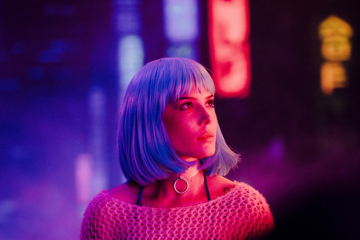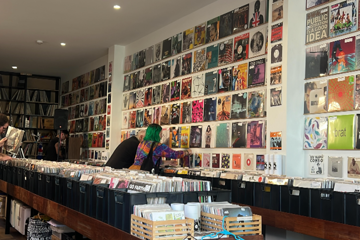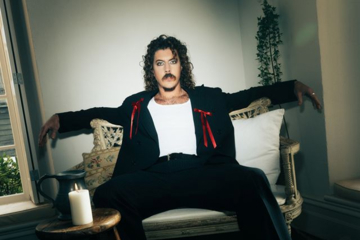Neon Festival
"To highlight that independent theatre doesn’t mean emerging or amateur; it can be all levels of experience and age making great strong work with the freedom that comes through independent theatre."
BRIGHT SIGNS
Last year's inaugural Neon Festival exceeded producer Martina Murray's expectations. She tells Oliver Coleman what this year's will bring.
The 2013 Neon Festival at Melbourne Theatre Company was a remarkable success in every way. Inside the walls of Southbank Theatre five independent companies produced work of superlative quality with the support and assistance of MTC. Critics were wowed, audiences were challenged and the artists produced some of the best work of their careers. Martina Murray, the producer of Neon, says of this experience, “To be honest, it exceeded our most optimistic expectations which is really testament to the kind of work being made by independent artists. It was received overwhelmingly well by critics and audiences, which was really inspiring, both to me as an individual and to the company and a rewarding experience for the artists involved.”
This year they're doing it all again and have welcomed a collection of theatre-makers as well as a season of play readings curated by MKA: Theatre of New Writing. Martina explains the process behind selecting the artists involved: “Because Neon is a celebration of independent theatre in Melbourne, the hope or idea when seeking out the five, or six if you include MKA's involvement in Neon Up Late, was to present a strong snapshot of the diversity of independent theatre. That you have people who make different works, that the aesthetics of no two works will be the same, and that the ages of the artists are varied as well. To highlight that independent theatre doesn't mean emerging or amateur; it can be all levels of experience and age making great strong work with the freedom that comes through independent theatre.”
Don't miss a beat with our FREE daily newsletter
For audiences it is the chance to see a diverse collection of works made by artists at the top of their game. Martina says that “each company is considered really in how it sits amongst the rest and then the individual companies are invited on the strength and diversity of their bodies of work”. This year, Neon will see work from the likes of queer theatre collective Little Ones Theatre subverting classic text Dangerous Liaisons; Melbourne independent theatre stalwart Angus Cerini crafting an expressionistic response to the trafficking of drugs, weapons and humans; Arthur bringing together a large ensemble of performers including Launceston College Ensemble to create a mixture of opera, cabaret and naturalism; Brian Lipson and Daniel Keene working together on a unique collaboration exploring the ordeals of one of the patients of the father of modern neurology; and finally, Nicola Gunn bringing her wacky, theatricalised social experiments to the Southbank Theatre.
After having such a successful inaugural festival what were the challenges of doing it the second time around? “I think the main concern is other people's comparisons; it is really important to me that this is five or six companies creating different works and not to compare one work to a work that they saw last year or to another one in the season. And I think that is the big challenge when something is a success, it's like second album syndrome; you will always be compared to what came previously, but in this case it's not MTC making the work, it's the artist and so they shouldn't be compared. They are very different aesthetics, they come from very different angles, different levels of resources – they shouldn't be compared at all. This is supporting new people, making their new work their way.”
The companies get complete freedom to make their shows however they want. The artists receive far-reaching support from MTC including most significantly, 100 percent of the box office takings. They also get an upfront $7,500 grant they can spend however they choose, as well as technical support and of course the use of MTC facilities. This whole process fosters relationships between the MTC and these artists that will carry on into the future. Most importantly however, Neon gives these artists the support to create invigorating work and the necessary exposure to present it to audiences they might otherwise not reach.

Dangerous Liaisons. Pic by Sarah Walker.
SEXY SUBVERSION
Dangerous Liaisons director Stephen Nicolazzo talks to Simon Eales about gender as performance and “giving characters an impetus to act in really terrible ways”.
MTC's Neon Festival of Independent Theatre principally deals with texts that break barriers. The companies involved are asking themselves how they can pull a text apart and how they can apply the text's dramaturgy to contemporary life. For Melbourne-based, high camp theatre company Little Ones, who bring the classic text, Dangerous Liaisons to the Neon stage, things are no different.
Following their smash hits Psycho Beach Party and Oscar Wilde's Salomé, as director Stephen Nicolazzo says, Little Ones' intention with Dangerous Liaisons was to explore the greater effects of sexual repression. “I think the thing that attracts me to the story is the idea of manipulation of societal expectations – giving characters an impetus to act in really terrible ways. I wanted to explore why characters, when oppressed, behave badly and what that means on a larger political scale, particularly in relation to sexuality.”
Using English playwright Christopher Hampton's stage adaptation of 18th century French writer Pierre Choderlos de Laclos' novel, Little Ones turns the story's already sexy plot and thematic structure on its head. “Having a female play the lead role, who is a misogynistic Don Juan type has unlocked an interesting political agenda for us: that sexuality and gender can be completely performative and have nothing to do with the actual sex of the character or the performer. You can actually utilise masculine or feminine gestures and tactics to get what you want. I think it's an extension of the themes we've been exploring over the last few years, but it's also a new exploration. It's one of the first texts we've tackled that isn't queer at its core.”
In this sense, the play has thrown up some interesting challenges. “It's been hard to lift those ideas [about queer sexuality] out of a play that wasn't written with that intention. The original intention of Dangerous Liaisons was not bent. It was an English writer interpreting a French novel which was all about class, whereas, I think, for us, it's not about class, it's about how sexuality is oppressed by class systems. For the most part it's actually working, but when we do hit walls it's about making sure our approach to the material is actually married to, and not imposed upon, the writing.”
Mining the text for these issues surrounding sex norms has opened up other hidden gems. “We have a penchant for comedy, and that's something that people, at least for the last 20 years, with this play, have seemed to forget. It's actually freaking hysterical and borrows from the structures of Moliére and from the clandestine theatre of the period which was run by debauched women who used to perform as men and invite the aristocracy to these shows and they'd all have sex. We've made it about exploring that history as well, and not just this sappy love story.”

Angus Cerini. Pic by Holly Engelhardt.
TRADING IDEAS
Angus Cerini never wants to do a solo show again, but revisits the theme of masculinity in society in his new work, he tells Harry Hughes.
Angus Cerini's theatre company doubletap has been on a roll. Their recent works have been nominated for and won multiple Green Room Awards and have built a fantastic reputation for Cerini, culminating in his new offering Resplendence being selected to be part of MTC's 2014 Neon Festival. The energetic writer, director and performer speaks passionately about his desire to respond to the world's problems through his work. “I'm trying to find that bit where we're not just animals, to find what is beautiful and amazing about us.”
Resplendence, a one-man show described as “a small interrogation by a man alone in a room”, will use the three largest trades – humans, drugs, and weapons – as a backdrop for exploration of these ideas. “Do these trades mean that all we want to do is root and escape reality and annihilate our competition?” asks Cerini. “Human nature is still caught up with these really base instincts, and yet we're an incredibly sophisticated, evolved species? I find that really interesting!”
The company's previous works have studied masculinity in society in various manifestations. Wretch, which won the 2007 Patrick White Playwrights' Award, portrays a young man in prison being visited by his mother, having to truly face what he has done. Indeed, the theme has been deemed important enough to return to for this year's show. “You only have to look at the last week in federal politics to see that these white, rich, middle class men are deciding everything about the world that we are all living in, and as a man we are also required in some way to be part of that patriarchy. Men are capable of such amazing things, whether it's friends of mine who are fathers or my own father. Then there are men who are capable of such miserable shit.” Being trapped between “being animals” and trying to be sophisticated makes men an “interesting gender” in the playwright's eyes.
It's been six years since Cerini has done a solo show, and he swore he would never do one again. “It's hard, it's lonely and exhausting, and it's like, 'Hi! It's the Angus Hour!'” But having a few key collaborators, including sound designer Jethro Woodward has meant that Cerini is not alone. Cerini and Woodward have worked together in the past on three developments and have collaborated for Resplendence on developing a palette that suits the work. “Every show needs a unique sound that comes only from the world of the show. It's not about bringing your own style and throwing it on top. You kind of look into the material and it tells you what it should be.”
Essentially, the pair “jam” together to create ideas. “The show will be a result of Jethro and I holding hands artistically. Sure, there'll be some arm wrestles and some punches in the face, but I quite like that idea.” Though Woodward won't be out on the stage, he will be programming pre-recorded sounds from a booth, triggered by what Cerini does on stage, meaning that every show will be different. “It's pretty cool when you're surrounded by artists who each have their own take on resplendence, and thank god everyone's a bit more cheerful than me!”

MKA. Pic by Holly Engelhardt.
BEDTIME STORIES
MKA's John Kachoyan chats to Simon Eales about Alraune's titular character, a girl without a soul, and the shaming culture towards women still present in modern society.
Melbourne's award-winning theatre company of new writing, MKA, will run the Up Late program at the MTC's Neon Festival this year. They will stage readings of three new plays, one of which, Alraune, directed by new MKA co-creative director John Kachoyan, is an update of a 100-year-old German folktale. As Kachoyan says, the play drives straight at issues of sex and femininity, and asks who exactly is responsible for morality and damnation.
“I'd been working with [Alraune writer] Meredith Penman in Sydney for the Bell Shakespeare company, and we'd just started some discussions of her writing and her work,” Kachoyan says of how the play was conceived. “We found that we were talking about similar things, and then Alraune came up. I mentioned that I was a bit obsessed with the story and I thought it had some really interesting potential. I said, look, do you want to read this crazy 100-year-old German thing, and see if you find some resonance with it?”
It seems she did. MKA have billed her adaptation as a cross between Pygmalion and Frankenstein with measures of the film Metropolis thrown in. The story is “really kind of sexy and different and unusual,” Kachoyan says. “The central character is fascinating. She's a girl born without a soul and she wreaks havoc all throughout her life. Eventually she comes to realise what she is, but it's not a simple story about a monster.”
While, like many European folktales of the time, it explores where the boundaries of humanity and the human body actually lie, for Kachoyan, it was vital to bring the story's engagement with feminine sexuality to a contemporary audience. “A lot of what people say about the character Alraune is that there are lots of tragic events that happen to her or around her and she actually never really does anything herself. It's kind of implied that she has an influence on people, but I think there's something kind of interesting about that. People try to control her and tell her where to go. In that sense it's a story about everyone else's morality. Lots of people fall in love with her and she's not necessarily responsible. We tend to demonise women in particular for that kind of thing. All this shaming culture and rape culture, and where we blame women and tell women to behave and be a certain way and act a certain way – and if they don't it's seen as their fault. I think we have this really strange culture that is filled with sexualisation and pop culture and then there's this other parallel story which says, 'behave yourself.' I think to some extent we're making these Alraune figures that are torn between worlds.”
This Up Late program, run in tandem with their own HPRTXT festival of plays, marks a new era for MKA. He came on-board to pick up where co-founding creative director Glyn Roberts left-off and is part of an expanded team including resident director Kat Henry and dramaturg Mark Wilson, who join ongoing co-founder Tobias Manderson-Galvin. “We're kind of growing up a bit. We're about four years old and we've survived on anarchy and the smell of an oily rag,” Kachoyan says. “The company's always been incredibly ambitious and this is just making those ambitions a little bit more explicit.”







